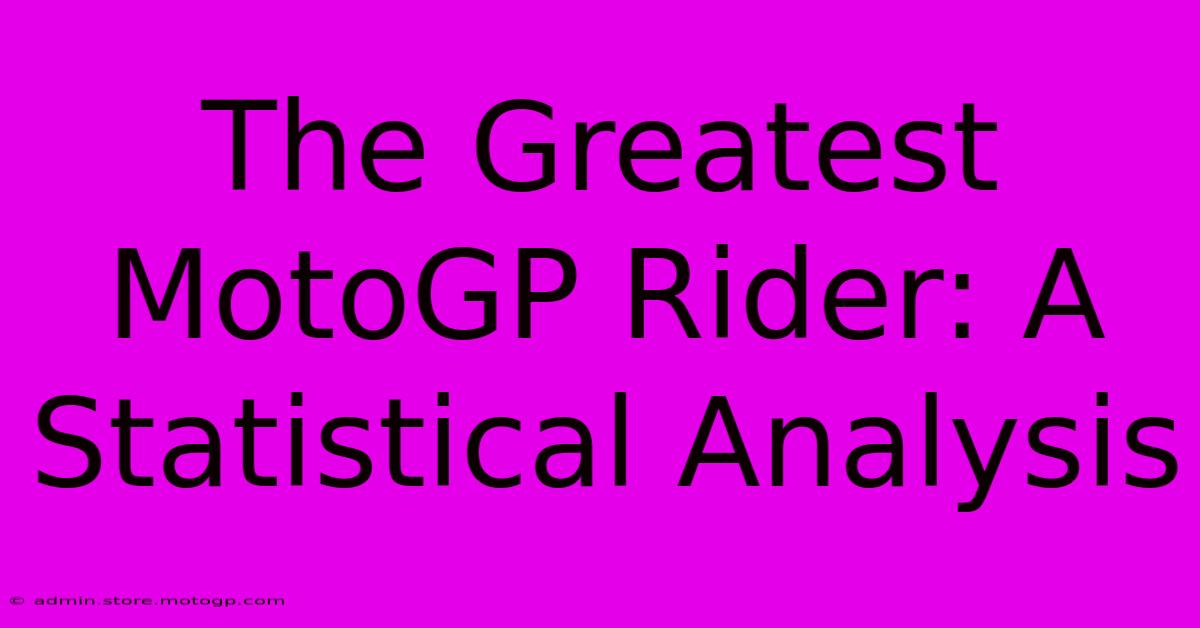The Greatest MotoGP Rider: A Statistical Analysis

Table of Contents
The Greatest MotoGP Rider: A Statistical Analysis
The question of who is the greatest MotoGP rider of all time is a hotly debated topic among fans. Passion runs deep, and arguments often hinge on personal preference and anecdotal evidence. However, a statistical analysis can provide a more objective, data-driven perspective, helping us sift through the legends and arrive at a more informed conclusion. While statistics can’t fully capture the artistry and bravery inherent in motorcycle racing, they offer a powerful tool for comparison.
Defining "Greatest": Key Metrics
Before we dive into the numbers, we must define what constitutes the "greatest." Is it about sheer number of wins? Championship titles? Pole positions? Consistency across seasons? A comprehensive analysis needs to consider several key performance indicators (KPIs):
- World Championships: The ultimate accolade, a World Championship represents a season of dominance. The number of championships won is a significant benchmark.
- Race Wins: The most straightforward measure of success, the total number of race victories speaks volumes about a rider's speed and racecraft.
- Pole Positions: Qualifying on pole demonstrates speed and bike setup mastery, offering a significant advantage in the race.
- Podium Finishes: Consistent podium finishes show not only speed but also resilience and the ability to capitalize on opportunities.
- Points Scored: A more nuanced metric, total points scored considers all race results, providing a broader picture of overall performance.
- Lap Records: Setting lap records highlights a rider's exceptional pace and understanding of the track.
Analyzing the Contenders: A Statistical Overview
Several names consistently emerge in the "greatest of all time" discussions. Let's analyze some statistical highlights for key contenders:
Giacomo Agostini: The Undisputed King (For Many)
Agostini, with 15 World Championships (8 x 500cc), holds a record that remains seemingly untouchable. His sheer number of wins (122 Grand Prix victories) dwarfs most other riders. His dominance in the 500cc class, the pinnacle of motorcycle racing at the time, cemented his legendary status. While the competitive landscape was different in his era, his consistency and sheer number of wins are undeniable.
Valentino Rossi: The Icon
"The Doctor" remains an incredibly popular figure, even in retirement. Rossi boasts nine World Championships (one 125cc, one 250cc, seven 500cc/MotoGP), 115 Grand Prix victories, and countless other accolades. His longevity at the top level, competing fiercely for almost two decades, is a testament to his skill and dedication. His popularity transcends the sport, making him a global icon.
Marc Marquez: The Aggressive Dominator
Marquez, with eight World Championships (six MotoGP, one Moto2, one 125cc), exhibits an aggressive riding style that has redefined MotoGP. His record-breaking number of consecutive wins, and his ability to consistently push the limits, makes him a strong contender. His career, however, has been punctuated by injuries, a factor impacting his overall statistical comparison.
Other Notable Riders
Many other riders deserve mention, including Mike Hailwood, Angel Nieto, John Surtees, and Casey Stoner, each with impressive statistical achievements and unique contributions to the sport. A full comparison involving all these riders would necessitate a significantly more extensive analysis.
The Limitations of Statistical Analysis
It's crucial to acknowledge the limitations of a purely statistical approach. Different eras of MotoGP have featured varying levels of competition, technological advancements, and rule changes. Comparing riders across such vastly different eras requires careful consideration. Furthermore, statistics don't fully capture intangible qualities like:
- Riding Style and Flair: Some riders possess an unmatched elegance and style, captivating audiences even if their numbers don't always tell the full story.
- Impact on the Sport: Certain riders have shaped the sport's culture and trajectory, influencing generations of racers and fans.
- Overcoming Adversity: A rider's resilience in the face of setbacks and injuries often defines their legacy as much as their wins.
Conclusion: No Single "Greatest"
Ultimately, determining the greatest MotoGP rider is a subjective endeavor. While statistical analysis provides a valuable framework for comparison, it cannot fully capture the nuances and complexities of this demanding sport. The legacies of Agostini, Rossi, Marquez, and others remain deeply intertwined in the rich tapestry of MotoGP history, each contributing their unique brilliance to the sport's enduring appeal. The "greatest" remains a matter of individual perspective, informed by data, but ultimately guided by personal appreciation for the sport's artistry and drama.

Thank you for visiting our website wich cover about The Greatest MotoGP Rider: A Statistical Analysis. We hope the information provided has been useful to you. Feel free to contact us if you have any questions or need further assistance. See you next time and dont miss to bookmark.
Featured Posts
-
Connecting With Moto Gp Commentators Online
Feb 18, 2025
-
F1 Austin Concert An Unmissable Experience
Feb 18, 2025
-
F1 Qualifying Today The Countdown To Lights Out
Feb 18, 2025
-
Moto Gp Sprint Race A Spectators Dream
Feb 18, 2025
-
F1 Parking Pass The Perfect Gift For A Race Fan
Feb 18, 2025
